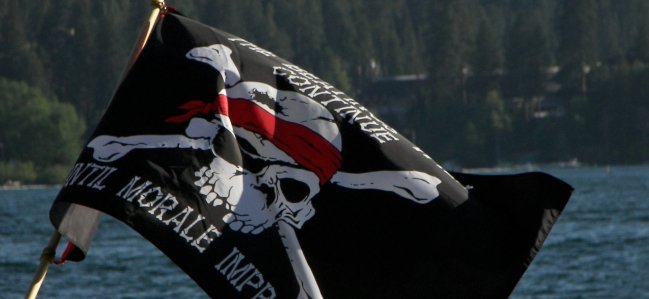3 Common Misunderstandings About Anti-Piracy Enforcement
 Whenever a copyright infringing site is shut down, a domain is seized, a service is blocked or a large-scale pirate arrested, there’s always a rallying cry against the copyright groups that orchestrated the move.
Whenever a copyright infringing site is shut down, a domain is seized, a service is blocked or a large-scale pirate arrested, there’s always a rallying cry against the copyright groups that orchestrated the move.
“They don’t understand the Internet!” or “They’ll never stop piracy!” are some of the things shouted back.
Having spent time talking with several people involved both with content lobbies and people involved in copyright enforcement. I can say safely that at least some truly don’t understand the Internet. However, taken as a whole, they certainly understand it better than the population at large and many, if not most, understand the Internet very well.
After all, the Internet is now at the core of their business, whether they want it to be or not, and they are at least working on it and thinking about it more than most.
But even if we accept that the copyright industry doesn’t get the Internet, there seems to be a lot that the Internet doesn’t get about piracy enforcement and its goals.
It’s easy to paint copyright enforcement efforts as being misguided when you look at how rampant piracy remains on the Internet. But it’s also possible that many just don’t understand the intentions of most anti-piracy efforts.
To be clear, this post is almost entirely from my conversations with others and is a response to the disjunct between what I’m hearing from those who do piracy enforcement and those who are impacted by it.
1. Anti-Piracy Efforts Aren’t about Stopping All Piracy
I’ve never, in nearly 8 years of running this site, heard any reasonable copyright holder say that they want to stamp out all piracy. It’s an unrealistic and unattainable goal. Furthermore, even if it were attainable, the costs would likely far outstrip any benefits.
The truth is piracy was a problem before the Internet and the rise of the Web didn’t make piracy more difficult or less common.
The goal of anti-piracy efforts are to reduce piracy, make it less appealing and help push potential customers back to legitimate alternatives. While the effectiveness of that is up for debate, anyone who is talking about “stopping piracy” is missing the point of piracy enforcement.
It was never about stopping all piracy, instead, it was about making piracy a less appealing alternative.
2. Piracy Enforcement Isn’t About Stopping All Pirates
Studies have shown that “hardcore” pirates, meaning those who have large libraries of pirated content and pirate content exclusively, are rare. Most people who infringe copyright consume a hybrid of content, pirating some material and obtaining others legitimately. Content creators would like that ratio to be more favorable.
Hardcore pirates are simply too small of an audience to worry about and, even if all of the illegal copies were removed, they likely still wouldn’t buy or legally obtain copyrighted works. In short, as the companies see it, there’s too few hardcore pirates to worry about and no money to be made even if they can reach them.
So, if you’re the type of pirate that would spend $10 per month on a VPN but not $10 on a Spotify account, you’ve most likely already been written off. While anti-piracy efforts may frustrate hardcore pirates from time to time, they aren’t the target of the efforts.
The only way hardcore pirates are directly targeted is when their actions are feeding the supply chain that trickles down to more casual ones, such as with scene groups.
3. Anti-Piracy Can Support New Business Models
One of the rallying cries that I routinely hear is that copyright holders need to develop new business models, that they need to adapt to the Web rather than trying to enforce copyright.
However, the two actions are not mutually exclusive and can be complimentary if done right.
Right now, between Spotify, Netflix, Steam, iTunes, Kindle and others there is unprecedented access to legal and affordable content. Large copyright holders are working to adapt to the Internet and have made great strides.
However, that doesn’t mean piracy enforcement isn’t still necessary. What value is a legitimate partnership with the record labels if illegal streaming sites operate unchallenged?
Anti-piracy efforts are often aimed less at stopping piracy and more at trying to pave the way for legitimate services. This was one of the motivators behind the switch from targeting end users, to targeting sites and services.
Bottom Line
So with all of this being said, the question is whether or not piracy enforcement works? The answer isn’t clear.
The truth is, as I’ve said before, every content creator is different. It’s very possible, even probable, that anti-piracy efforts can have a drastic impact on the bottom line of one copyright holder or one copyrighted work but not another.
In my personal experience, works that are very broadly consumed and loved are difficult to have any impact on. The latest blockbuster movie or hit CD is a tough thing to protect or make more difficult to access illegally. However, since non-litigious piracy enforcement is relatively inexpensive compared to the cost and the revenue from the work, most will do it simply because any impact, no matter how small, will justify the cost.
Lesser-known works, however, can be more easily protected but anti-piracy efforts are a much bigger risk for individual or small companies that create content. Though taking out a handful of pages can frustrate anyone searching for illegal copies, the cost of even that amount of enforcement might be too much to justify.
Still, when I talk to rightsholders about the effectiveness of their anti-piracy efforts, there’s usually a sense of frustration that the battle is seemingly never-ending, but yet a continued push forward on doing it.
In the end though, as I’ve said before, real solutions don’t come from anti-piracy efforts alone. But nor do they come from business model changes alone or or legal changes alone.
Real solutions come from combination efforts that combine enforcement with improved access and smart legislation. There’s no easy answers here and anti-piracy efforts are, at most, a piece of the puzzle.
The real mistake isn’t that many copyright holders use anti-piracy efforts heavily, but that they use them exclusively…
Want to Reuse or Republish this Content?
If you want to feature this article in your site, classroom or elsewhere, just let us know! We usually grant permission within 24 hours.
